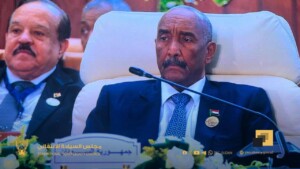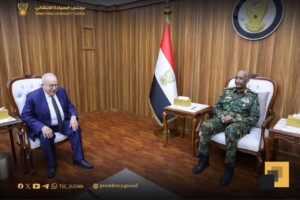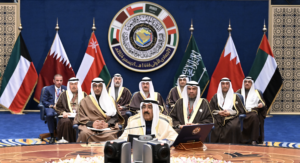Falata, Salamat make peace in South Darfur
Leaders of the Falata and Salamat tribes signed a peace agreement in South Darfur on Thursday, in the presence of Hasabo Abdelrahman, Second Vice-President of Sudan.
Over the past years, Falata and Salamat in southern Darfur entered into bloody conflicts over water sources and pastures. Hundreds of tribesmen on both sides were killed and thousands of villagers displaced.
During the reconciliation conference in Buram on Thursday, the tribes agreed to pay compensation for the losses on both sides, in four instalments starting from June 1.
The tribal leaders recommended the enhancement of the rule of law in the region, the opening of more markets, better maintenance of water sources, and clearly defined pastures.
‘Criminal networks’
Speaking at the signing ceremony, both the second vice-president and the South Darfur state governor confirmed that the recommendations of the tribal leaders will be set into a law, obliging both parties to enforce the terms of the agreement.
Abdelrahman further pointed to a number of criminal networks in Darfur that terrorise the people in the region. He said that they hid many of their weapons underground after the authorities began collecting illicit arms in the region in August last year.
He stressed that the Sudanese government is keen to establish security, stability and development in the five states of Darfur, and stressed the authorities’ “continued efforts in the disarmament process”.
 Falata and Salamat leaders sign a peace agreement in Buram (SUNA)
Falata and Salamat leaders sign a peace agreement in Buram (SUNA)
Leaders of the Falata and Salamat tribes signed a peace agreement in South Darfur on Thursday, in the presence of Hasabo Abdelrahman, Second Vice-President of Sudan.
Over the past years, Falata and Salamat in southern Darfur entered into bloody conflicts over water sources and pastures. Hundreds of tribesmen on both sides were killed and thousands of villagers displaced.
During the reconciliation conference in Buram on Thursday, the tribes agreed to pay compensation for the losses on both sides, in four instalments starting from June 1.
The tribal leaders recommended the enhancement of the rule of law in the region, the opening of more markets, better maintenance of water sources, and clearly defined pastures.
‘Criminal networks’
Speaking at the signing ceremony, both the second vice-president and the South Darfur state governor confirmed that the recommendations of the tribal leaders will be set into a law, obliging both parties to enforce the terms of the agreement.
Abdelrahman further pointed to a number of criminal networks in Darfur that terrorise the people in the region. He said that they hid many of their weapons underground after the authorities began collecting illicit arms in the region in August last year.
He stressed that the Sudanese government is keen to establish security, stability and development in the five states of Darfur, and stressed the authorities’ “continued efforts in the disarmament process”.











 and then
and then